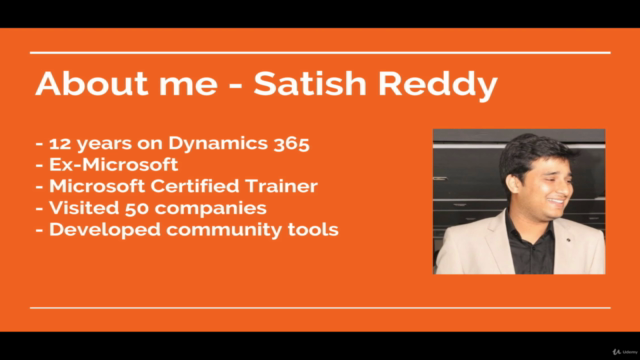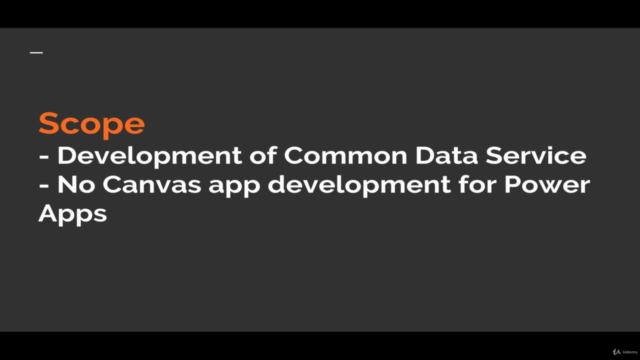Microsoft Dynamics 365 & PowerApps Developer Course - Part 1

Why take this course?
¡Claro! The Microsoft Dynamics 365 & Power Apps Developer Course you've described is a comprehensive program that covers a wide range of topics essential for developing custom solutions within the Dynamics 365 ecosystem. It seems to be well-structured and follows a logical progression from foundational concepts to more advanced topics.
Here are some suggestions on how to enhance the course, particularly focusing on the use of FetchXML or LINQ in plugins:
-
Deep Dive into FetchXML: Since FetchXML is a powerful query language for Microsoft Dataverse (formerly known as Common Data Service), it would be beneficial to have a dedicated module that dives deeper into its capabilities. This could include complex filtering, sorting, and grouping, as well as handling pagination and understanding how to optimize performance with FetchXML.
-
LINQ Exploration: Similarly, LINQ (Language Integrated Query) is a powerful feature for querying and updating the Dataverse using .NET languages. A more in-depth exploration of LINQ could cover advanced scenarios such as working with complex entity relationships, dealing with one-to-many and many-to-one relationships, and leveraging LINQ to perform bulk updates or deletes efficiently.
-
Performance Considerations: When discussing both FetchXML and LINQ, it would be crucial to cover best practices for performance optimization. This could include understanding how to minimize the number of queries, handling large data sets, and avoiding common pitfalls that can lead to slow or inefficient code.
-
Security and Access Control: A module on security aspects when using FetchXML or LINQ would be important. This would cover how to ensure that the data accessed by plugins respects the security roles and privileges of the users, thus maintaining the integrity and confidentiality of the data.
-
Asynchronous Processing: In the context of plugins and server-side processing, covering asynchronous operations with FetchXML or LINQ can be very useful. This would help developers to understand how to perform long-running or intensive operations without blocking the user interface or causing performance issues.
-
Error Handling and Exception Management: A section dedicated to robust error handling and exception management in plugin development, especially when using FetchXML or LINQ, would be beneficial. This would cover how to catch and handle exceptions gracefully, ensuring the system remains stable even when unexpected errors occur.
-
Real-World Scenarios: Implementing real-world scenarios where developers can see both FetchXML and LINQ in action within business processes would provide a practical context to understand their strengths and weaknesses.
-
Upcoming Features and Best Practices: Keeping the course content up-to-date with the latest features from Microsoft, such as new capabilities or changes introduced in the Dataverse platform, is crucial for maintaining the relevance of the training material.
-
Integration Patterns: Discussing common integration patterns and anti-patterns when using FetchXML or LINQ can help developers understand best practices and avoid common mistakes.
-
Testing Strategies: Finally, a module on testing strategies for plugin development, including how to test scenarios that involve FetchXML or LINQ queries, would be very beneficial. This could cover unit testing, integration testing, and the use of tools like CUnit or Xunit.
By incorporating these elements into the course, you can provide a more comprehensive and practical learning experience for developers looking to master Dynamics 365 and Power Apps development. Remember that hands-on practice, real-world examples, and staying current with Microsoft's updates are key components of an effective training program.
Course Gallery




Loading charts...
Comidoc Review
Our Verdict
This Dataverse Developer Course offers in-depth knowledge of extending Dynamics 365 & Power Apps, catering well to those with a foundation in its fundamentals. While some elements like audio quality, hands-on experience, and UI updates may be areas for improvement, the course's vast coverage of advanced coding concepts and architecture make it a valuable resource.
What We Liked
- Excellent coverage of Dataverse (formerly Common Data Service) development, including custom business logic with Dataverse SDK and plugins.
- In-depth exploration of advanced coding concepts for Dataverse and Microsoft Dynamics 365 & Power Apps.
- Comprehensive guidance on debugging plugins and workflows within the Dataverse environment.
- Dedicated lessons on Dataverse Web Services interaction from custom code, enabling seamless integration.
- Highly knowledgeable instructor, extensively experienced in Dataverse and Microsoft Dynamics 365 & Power Apps architecture.
Potential Drawbacks
- Sound quality inconsistencies need improvement, with variations in amplitude affecting the overall listening experience.
- Coding practices could be more refined, following best practices for enhanced learning value.
- The course focuses on applying theoretical concepts rather than a hands-on approach, leaving certain areas less explored.
- Occasionally moves at a fast pace that might challenge beginners to grasp the content without rewinding.
- UI updates would help newcomers navigate and learn more efficiently.